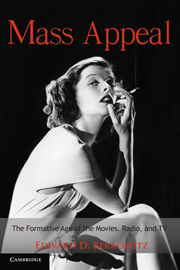Book contents
- Frontmatter
- Contents
- Acknowledgments
- Introduction
- 1 Sound Comes In, Vaudeville and Silent Pictures Go Out
- 2 From Broadway to Hollywood with Groucho, Fred, and Ginger
- 3 Radio Nights
- 4 From the Thirties to the Forties with Kate, Bud, and Lou
- 5 Bogie, Bob, and the Boys at War
- 6 The Postwar Movie Scene
- 7 Make Room for TV
- 8 Putting It Together: Walt Disney Introduces the Baby Boom to Television
- 9 The End of an Era?
- Notes
- Movie, Radio, and TV Listings
- Index
Introduction
Published online by Cambridge University Press: 05 June 2012
- Frontmatter
- Contents
- Acknowledgments
- Introduction
- 1 Sound Comes In, Vaudeville and Silent Pictures Go Out
- 2 From Broadway to Hollywood with Groucho, Fred, and Ginger
- 3 Radio Nights
- 4 From the Thirties to the Forties with Kate, Bud, and Lou
- 5 Bogie, Bob, and the Boys at War
- 6 The Postwar Movie Scene
- 7 Make Room for TV
- 8 Putting It Together: Walt Disney Introduces the Baby Boom to Television
- 9 The End of an Era?
- Notes
- Movie, Radio, and TV Listings
- Index
Summary
Beginning in the third decade of the twentieth century, talking pictures, radio, and then television appeared on the American scene. Along with recorded music available first on phonograph records and then on such devices as compact discs, these three forms of entertainment, each of which relied on the mechanical transmission of sound into homes or movie theaters, dominated American popular culture between 1928 and the end of the century.
Each year, Americans sampled the available movies, radio programs, and television programs. Their choices reflected the categories that divided them, such as gender, region, race, and ethnicity, but the fact that all chose from the same basic menu meant that popular culture united Americans far more than it separated them. Even regional forms of entertainment, such as the country music broadcast over the Grand Ole Opry program from Nashville, reached wide audiences.
- Type
- Chapter
- Information
- Mass AppealThe Formative Age of the Movies, Radio, and TV, pp. 1 - 2Publisher: Cambridge University PressPrint publication year: 2010
- 1
- Cited by

